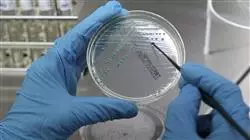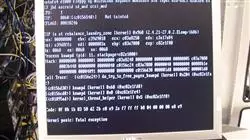University certificate
The world's largest faculty of medicine”
Introduction to the Program
This specialization will provide you with a sense of security in medical practice, which will help you grow personally and professionally”

The scale and complexity of genomic data dwarf the measurements traditionally used in laboratory testing. In recent years there has been an enormous development of informatics to analyze and interpret DNA sequencing, and it has created a gap between biological knowledge and its application to routine clinical practice. It is therefore necessary to educate, disseminate and incorporate these informatics techniques among the medical community in order to be able to interpret the massive analysis of data from publications, biological or medical databases and medical records, among others, and thus enrich the biological information available at the clinical level.
This machine learning will enable the development of precision oncology, in order to interpret genomic characteristics and find targeted therapies, or to identify risks to certain diseases and establish more individualized preventive measures. A fundamental objective of the program is to bring students closer to and disseminate computer knowledge, which is already applied in other fields of knowledge but has minimal implementation in the medical world, despite the fact that for genomic medicine to become a reality, it is necessary to accurately interpret the huge volume of clinical information currently available and associate it with the biological data generated after a bioinformatic analysis. While this is a difficult challenge, it will allow the effects of genetic variation and potential therapies to be explored quickly, inexpensively and with greater precision than is currently possible.
Humans are not naturally equipped to perceive and interpret genomic sequences, to understand all the mechanisms, pathways and interactions that take place within a living cell, nor to make medical decisions with tens or hundreds of variables. To move forward, a system with superhuman analytical capabilities is required to simplify the work environment and show the relationships and proximities between variables. In genomics and biology, it is now recognized that it is better to spend resources on new computational techniques than on pure data collection, something that is possibly the same in medicine and, of course, oncology.
Update your knowledge with the Postgraduate diploma in the Use of Linux and R Language Programming for Oncology"
This Postgraduate diploma in Use of Linux and R Language Programming for Oncology is the most complete and up-to-date scientific program on the market. Its most notable features are:
- Development of practical cases presented by experts in the use of Linux and programming with R language for oncology. Its graphic, schematic and eminently practical contents provide scientific and practical information on those disciplines that are essential for professional practice
- News developments in the use of linux and R language programming for oncology
- It contains practical exercises where the self-assessment process can be carried out to improve learning
- With special emphasis on innovative methodologies in the use of linux and R language programming for oncology
- All of this will be complemented by theoretical lessons, questions to the expert, debate forums on controversial topics, and individual reflection assignments
- Content that is accessible from any fixed or portable device with an Internet connection
This diploma may be the best investment you can make in the selection of an updated program for two reasons: besides updating your knowledge in the use of Linux and programming with R language for oncology, you will obtain a Postgraduate diploma from TECH Global University"
It includes in its teaching staff professionals belonging to the field of the use of linux and R language programming for oncology, who pour into this specialization the experience of their work, as well as recognized specialists belonging to reference societies and prestigious universities.
Thanks to its multimedia content elaborated with the latest educational technology, this Postgraduate diploma will allow the professional a situated and contextual learning, that is to say, a simulated environment that will provide an immersive learning programmed to work in real situations.
This program is designed around Problem-Based Learning, whereby the student must try to solve the different professional practice situations that arise during the course. For this, the student will have the help of an innovative interactive video system made by recognized experts in the field of the use of linux and R language programming for oncology and with great teaching experience.
Increase your decision-making confidence by updating your knowledge through this Postgraduate diploma"

Take the opportunity to learn about the latest advances in the Use of Linux and R Language Programming for Oncology and improve patient care"
Why study at TECH?
TECH is the world’s largest online university. With an impressive catalog of more than 14,000 university programs available in 11 languages, it is positioned as a leader in employability, with a 99% job placement rate. In addition, it relies on an enormous faculty of more than 6,000 professors of the highest international renown.

Study at the world's largest online university and guarantee your professional success. The future starts at TECH”
The world’s best online university according to FORBES
The prestigious Forbes magazine, specialized in business and finance, has highlighted TECH as “the world's best online university” This is what they have recently stated in an article in their digital edition in which they echo the success story of this institution, “thanks to the academic offer it provides, the selection of its teaching staff, and an innovative learning method aimed at educating the professionals of the future”
A revolutionary study method, a cutting-edge faculty and a practical focus: the key to TECH's success.
The most complete study plans on the university scene
TECH offers the most complete study plans on the university scene, with syllabuses that cover fundamental concepts and, at the same time, the main scientific advances in their specific scientific areas. In addition, these programs are continuously being updated to guarantee students the academic vanguard and the most in-demand professional skills. In this way, the university's qualifications provide its graduates with a significant advantage to propel their careers to success.
TECH offers the most comprehensive and intensive study plans on the current university scene.
A world-class teaching staff
TECH's teaching staff is made up of more than 6,000 professors with the highest international recognition. Professors, researchers and top executives of multinational companies, including Isaiah Covington, performance coach of the Boston Celtics; Magda Romanska, principal investigator at Harvard MetaLAB; Ignacio Wistumba, chairman of the department of translational molecular pathology at MD Anderson Cancer Center; and D.W. Pine, creative director of TIME magazine, among others.
Internationally renowned experts, specialized in different branches of Health, Technology, Communication and Business, form part of the TECH faculty.
A unique learning method
TECH is the first university to use Relearning in all its programs. It is the best online learning methodology, accredited with international teaching quality certifications, provided by prestigious educational agencies. In addition, this disruptive educational model is complemented with the “Case Method”, thereby setting up a unique online teaching strategy. Innovative teaching resources are also implemented, including detailed videos, infographics and interactive summaries.
TECH combines Relearning and the Case Method in all its university programs to guarantee excellent theoretical and practical learning, studying whenever and wherever you want.
The world's largest online university
TECH is the world’s largest online university. We are the largest educational institution, with the best and widest online educational catalog, one hundred percent online and covering the vast majority of areas of knowledge. We offer a large selection of our own degrees and accredited online undergraduate and postgraduate degrees. In total, more than 14,000 university degrees, in eleven different languages, make us the largest educational largest in the world.
TECH has the world's most extensive catalog of academic and official programs, available in more than 11 languages.
Google Premier Partner
The American technology giant has awarded TECH the Google Google Premier Partner badge. This award, which is only available to 3% of the world's companies, highlights the efficient, flexible and tailored experience that this university provides to students. The recognition as a Google Premier Partner not only accredits the maximum rigor, performance and investment in TECH's digital infrastructures, but also places this university as one of the world's leading technology companies.
Google has positioned TECH in the top 3% of the world's most important technology companies by awarding it its Google Premier Partner badge.
The official online university of the NBA
TECH is the official online university of the NBA. Thanks to our agreement with the biggest league in basketball, we offer our students exclusive university programs, as well as a wide variety of educational resources focused on the business of the league and other areas of the sports industry. Each program is made up of a uniquely designed syllabus and features exceptional guest hosts: professionals with a distinguished sports background who will offer their expertise on the most relevant topics.
TECH has been selected by the NBA, the world's top basketball league, as its official online university.
The top-rated university by its students
Students have positioned TECH as the world's top-rated university on the main review websites, with a highest rating of 4.9 out of 5, obtained from more than 1,000 reviews. These results consolidate TECH as the benchmark university institution at an international level, reflecting the excellence and positive impact of its educational model.” reflecting the excellence and positive impact of its educational model.”
TECH is the world’s top-rated university by its students.
Leaders in employability
TECH has managed to become the leading university in employability. 99% of its students obtain jobs in the academic field they have studied, within one year of completing any of the university's programs. A similar number achieve immediate career enhancement. All this thanks to a study methodology that bases its effectiveness on the acquisition of practical skills, which are absolutely necessary for professional development.
99% of TECH graduates find a job within a year of completing their studies.
Postgraduate Diploma in the Use of Linux and Programming with R Language for Oncology
The Postgraduate Diploma in the Use of Linux and Programming with R Language for Oncology is a specialization specially designed for those professionals who wish to acquire advanced knowledge in the use of the Linux operating system and its application in the field of Oncology, using the R programming language. This program is oriented to specialists in Health Sciences, Software Engineers, programmers and all those professionals who want to deepen their knowledge in the use of the Linux operating system and in programming with R for its application in the field of Oncology. The objective of the Postgraduate Diploma in the Use of Linux and R Programming for Oncology is to provide students with the necessary tools for the creation, maintenance and improvement of highly complex computer systems, with specific applications in the diagnosis, treatment and monitoring of cancer. At the same time, the program seeks to promote the use of data analysis and processing tools that will enable more effective and accurate decision making. During the development of the Postgraduate Diploma, students will learn about the fundamental principles of Linux, its installation and configuration, as well as package and program management, user administration and permissions, the use of the command line and task automation.
Fulfill your professional dreams by studying at TECH
The benefits of studying online are many, saving time and transportation are the most important. That is why TECH Global University brings this Postgraduate Diploma to your home with all the technological and educational tools on the market. We have the best teachers in the world, who will take your professional career to another level. In conclusion, the Postgraduate Diploma in Linux and R Programming for Oncology is a high quality academic program designed for health and technology professionals to acquire advanced skills in these areas, improving their data analysis capacity and providing more accurate and effective solutions in the treatment and monitoring of cancer.







